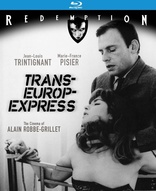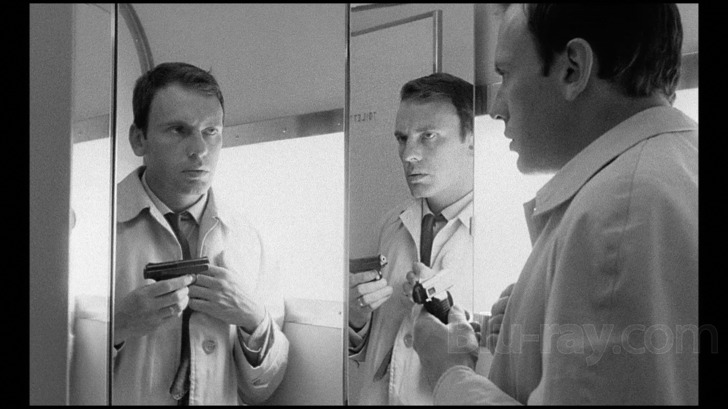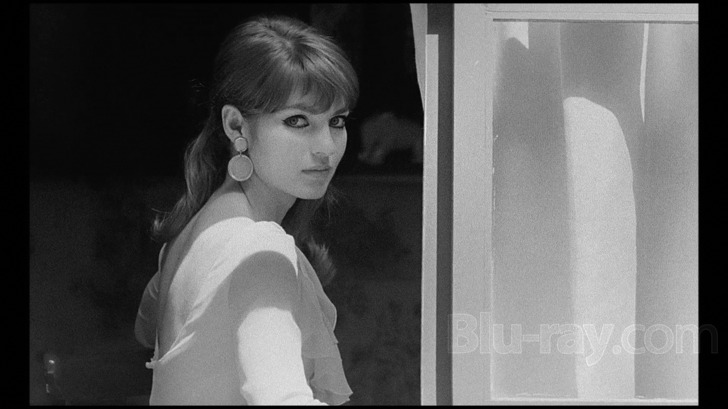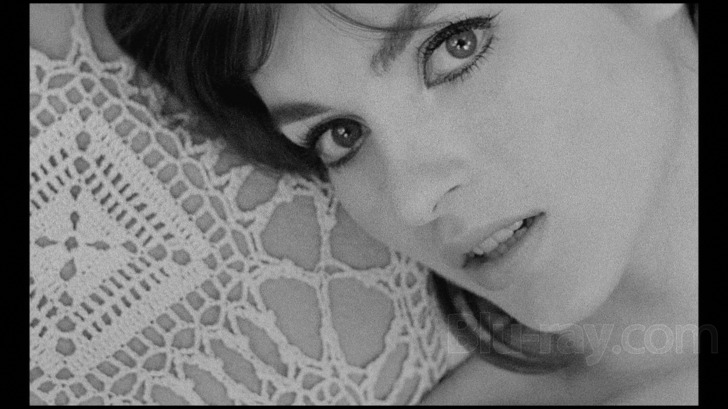Trans-Europ Express Blu-ray Movie
HomeTrans-Europ Express Blu-ray Movie 
Redemption | 1967 | 94 min | Not rated | Feb 11, 2014
Movie rating
6.6 | / 10 |
Blu-ray rating
| Users | 0.0 | |
| Reviewer | 3.5 | |
| Overall | 3.5 |
Overview
Trans-Europ Express (1967)
A film director, Jean, his producer, Marc, and his assistant, Lucette, board the Trans-Europ-Express in Paris bound for Antwerp. Once in their compartment it occurs to them that the drama of life aboard the train presents possibilities for a film, and they begin to write a script about dope smuggling. Subsequently, they see actor Jean-Louis Trintignant walking through the station. As seen through the eyes of Jean, Marc, and Lucette, Trintignant becomes Elias, the chief character in the script. Elias is going to Antwerp to pick up a suitcase of cocaine for delivery to an international organization based in Paris.
Starring: Jean-Louis Trintignant, Marie-France Pisier, Christian Barbier (I), Raoul Guylad, Henri LambertDirector: Alain Robbe-Grillet
| Foreign | 100% |
| Thriller | Insignificant |
Specifications
Video
Video codec: MPEG-4 AVC
Video resolution: 1080p
Aspect ratio: 1.66:1
Original aspect ratio: 1.66:1
Audio
French: LPCM 2.0
Subtitles
English
Discs
50GB Blu-ray Disc
Single disc (1 BD)
Playback
Region A (locked)
Review
Rating summary
| Movie | 3.5 | |
| Video | 3.5 | |
| Audio | 3.5 | |
| Extras | 3.0 | |
| Overall | 3.5 |
Trans-Europ Express Blu-ray Movie Review
The Seductive, Circular Cinema of Alain Robbe-Grillet
Reviewed by Casey Broadwater February 20, 2014More often associated with literature than with cinema, Alain Robbe-Grillet nonetheless made his mark on both, with fractured, circular, and/or self-
reflexive non-narratives that consciously pushed against what was expected of the two mediums. In the mid-1950s, his novels Le Voyeur and
La Jalousie established him as a key figure in the development of the Nouveau Roman (New Novel), a movement, caught in the gray
area between modernism and postmodernism, that attempted to do for fiction what the imminent Nouvelle Vague (New Wave) would do for
film—unhinge itself from the bourgeois "tradition of quality"-type storytelling of the 19th and early 20th centuries. "Plot" and "character" would no
longer be givens, and meta or non-linear narratives, along with other experimental forms, took the place of "straight" stories.
A key difference between the New Novelists and the New Wavers, however, was the role of authorial intent. While the former group sought to excise
the personal from their work, the latter placed an importance on directorial style and outlook and authority, which the critic-filmmakers at Cahiers
du Cinéma dubbed "auteur theory." For as much as Robbe-Grillet downplayed his own individual creative function in his novels—he once wrote,
“They are saying that the writer has a worldview, a sort of truth that he wishes to communicate, and that his writing has an ulterior significance. I am
against this”—when it comes to cinema, he is unreservedly an auteurist, with a vision and peculiarities that are all his own.
In his screenwriting debut, 1961's cryptic Last Year at Marienbad, he's credited as "co-auteur" with director Alain Resnais, and on the basis of
that film's success—it was nominated for that year's "Original Screenplay" Oscar and won the Golden Lion at the Venice Film Festival—he launched his
own directorial career, characterized by a defiantly kinky eroticism and oblique, inverted takes on the murder mystery and detective genres. His films
were never as successful as those of his New Wave contemporaries, and historically, they've been hard to track down on home video in the U.S., where
they've never officially been released. That changes this year, however, as Kino-Lorber—under their Redemption Films label—are releasing six of Robbe-
Grillet's films, starting this month with Trans-Europ-Express and Successive Slidings of Pleasure.

1966’s Trans-Europ-Express, the closest Robbe-Grillet ever came to a commercial success, sounds decidedly non-commercial when summed up; in essence, it’s an erotic, meta, anti-thriller with a fragmented plot that leads precisely nowhere. In an interview included on the disc, Robbe-Grillet himself admits as much: “In general, nothing really important happens in my films—it’s the way certain scenes recur.” Fortunately, Robbe- Grillet’s way is, for the most part, fascinating. He deals in repetitions; he repurposes old genre tropes; he circles and recycles and evokes a senselessness that comes to make an odd kind of sense.
The film opens on the titular train, aboard which a film director, Jean (played by the director himself), is traveling between Paris and Antwerp with his secretary/script supervisor (played by the director’s real-life wife, Catherine Robbe-Grillet) and his producing partner (played by actual producer Paul Louyet). Already we’re in meta-fiction territory. “We should set a film on a train like this. We could call it Trans-Europ-Express,” says the producer, and yes, the rest of the film is basically about the creation of itself—the technical term here is poioumena—with the three moviemakers inventing on the spot a story about a young drug trafficker being initiated into the trade. (“Something exciting. With fights, violence, rape.”) As they throw out suggestions for possible subplots and narrative twists, we see these new developments play out on screen. Of course, because the director and his cohorts are still in the brainstorming stage, they keep undoing and rewriting as they go along, attempting to be cohesive but inevitably introducing plot holes and confusions that require even further revisions.
The trafficker, who they call Elias, is played by Robbe-Grillet regular Jean-Louis Trintignant, and the natures of the character and the actor begin to bleed into one another. (Is Trintignant playing some hypothetical future criminal version of himself?) He’s equipped with a false-bottomed suitcase and a hollowed-out book that holds a pistol he’s expressly forbidden to use. He’s sent on numerous clandestine errands, which his bosses have arranged to test his loyalty. He wanders the streets of Antwerp, meeting dodgy contacts and whispering code words. It’s something of a shaggy dog tale, incidental and irrelevant, but it’s also playful and clever, subverting expectations at every turn. And this is the point; the “filmmakers,” the “actors,” the “characters,” even we as the audience, are creating this story on the fly, bringing order out of chaos while simultaneously enjoying the friction of disorder and paradox and impossibility.
It also has to be said that Trans-Europ-Express was the first time that Robbe-Grillet was given the freedom to visualize his own erotic predilections on screen. A lifelong sadist, he even drew up a ”Contract of Conjugal Prostitution” for his wife, who didn’t actually sign it, but did submit to its demanding requirements of sexual submissiveness. (After his death, she herself became a dominatrix, and now lives with a submissive woman 32 years her junior.) In the film, Elias buys a bondage magazine at the train station—mirroring a near-identical shot of Robbe-Grillet as “Jean” doing the same—and later becomes involved with a prostitute (the stunning Marie-France Pisier) who may or may not be an agent of his drug trafficking bosses. He tells her that he’s interested in “rape, only rape,” and the two have a series of S&M sessions where the sex is manifestly consensual but nonetheless uncomfortable to watch. The film is as comic as it is carnal, though, which keeps Trans-Europ-Express from going off the rails and crashing through some kind of autoerotic fantasyland.
Trans-Europ Express Blu-ray Movie, Video Quality 

"Newly remastered in HD from the original 35mm elements"—as it says on the back of the case—Kino/Redemption's 1080p/AVC-encoded transfer of Trans-Europ-Express is true to source and free of major distractions. Some minor, age-related print damage remains, but nothing more than occasional specks. (And compared to some of other films released under the Redemption label, this one is practically pristine.) Be forewarned; the film's 35mm grain pattern is quite heavy, but this is vastly preferable to an image that's been scrubbed of all texture with digital noise reduction. "Filmic," then, is a good way to describe the picture, which isn't exactly sharp—because of the chunky grain—but clearly benefits from its new high definition resolution. Tonally, the image is well-adapted here as well. There are some slight inconsistencies and fluctuations in contrast, but generally, whites are never blown out, black levels are never oppressive, and there's a rich spectrum of grays between the two. Really, we couldn't have asked for better for a film of this era and budget, especially considering that Trans-Europ-Express was only previously available via bootlegs and imports.
Trans-Europ Express Blu-ray Movie, Audio Quality 

Similarly, the disc's uncompressed Linear PCM 2.0 audio track has its share of age and source-related quirks—some light muffling, a limited dynamic range for Michel Fano's score, a few rare crackles—but nothing even remotely distracting or harsh. For the most part, the French dialogue comes through clearly, and there are no noticeable hisses or dropouts. The disc features only English subtitles, which appear in easy-to-read white lettering.
Trans-Europ Express Blu-ray Movie, Special Features and Extras 

- Alain Robbe-Grillet Interview (HD, 32:44): In this lengthy interview conducted by Frédéric Taddeï, Robbe-Grillet discusses the origin of the story, the importance of making inexpensive, independent features, and how the Trans-Europ-Express allowed him to film his own fantasies for the first time. In French, with English subtitles.
- Trailers: Includes high definition trailers for Trans-Europ-Express, The Man Who Lies, and Eden And After.
- 2014 Promo (HD, 2:09): A promotional trailer for Redemption's "The Cinema of Alain Robbe-Grillet" collection, with clips from all six films.
Trans-Europ Express Blu-ray Movie, Overall Score and Recommendation 

lt wasn't his first film—that would be 1963's French/Turkish co-production L'Immortelle—but Trans-Europ-Express is the ideal introduction to the cinema of Alain Robbe-Grillet. All of the director's hallmarks are here in a nascent stage—double agents and doppelgangers, fragmented plotting and S&M kink, self-referentialism and the toying with genre—and while the story is ultimately a shaggy dog tale leading nowhere, the journey, in this case, is the destination. Recommended for literature majors, connesueirs of 1960s euro-tica, and anyone interested in the lesser- seen films of the French New Wave.
Similar titles
Similar titles you might also like

Successive Slidings of Pleasure
Glissements progressifs du plaisir
1974

N. a pris les dés...
N. Took the Dice
1971

The Man Who Lies
L'homme qui ment / L'uomo che mente
1968

Eden and After
L'éden et après
1970

L' Immortelle
The Immortal One
1963

The Image Book
Le livre d'image
2018

Elles
2011

Faces Places
Visages villages
2017

Chronicle of a Summer
Chronique d'un été
1961

Diva
1981

The Crimson Rivers
Les Rivières Pourpres
2000

The Lady in the Car with Glasses and a Gun
2015

A Touch of Sin
天注定 / Tian zhu ding
2013

La Bête Humaine
1938

36th Precinct
36 quai des Orfèvres
2004

Farewell
L'affaire Farewell
2009

The Murderer Lives at Number 21
L'Assassin habite... au 21
1942

Nathalie...
2003

Things to Come
L'avenir
2016

Monsieur Hire
1989